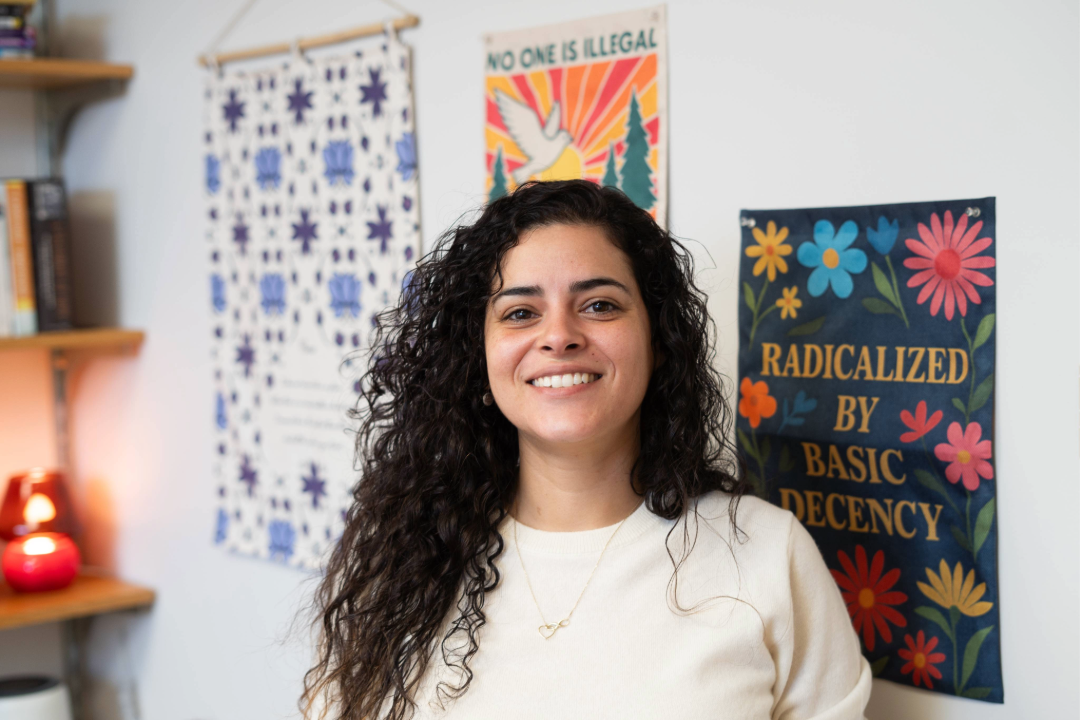Alicia Maldonado-Zahra holds a position that isn’t familiar to many at Goshen College: scholar-activist, a role that fits her. “So my role is both faculty, so I work within the religion, justice and society department half-time,” she said.
“And then the other half of my time is dedicated to student life: doing advocacy work, supporting students in their advocacy work, doing community building on campus, but also with the greater Goshen community.” She also works with The Coalition to Dismantle the Doctrine of Discovery, which is an Indigenous rights and advocacy network.Part of Maldonado-Zahra’s vision for GC is making sure students know they don’t have to navigate difficult moments alone. Whether someone wants to organize a protest, bring attention to an issue or simply ask hard questions, she hopes to be a steady source of guidance.
“I will support students however they need. If they’re like, ‘Hey, we want to do vision and mission work, we want to figure out over the next four years what our vision is and how we can work towards our vision,’ I’ll do that. I’ll work with them in facilitating that space. If they want to organize calls and write letters, I will support their work.” she said.
In her first months on campus, Maldonado-Zahra has been patiently building connections. Teaching Transforming Conflict and Violence has given her a starting point.
“I’m just getting to know students,” she said. “I teach a class, and those students are awesome. We’re now near the end of the semester, and that’s when we’re actually really starting to know each other.”
Outside the classroom, she’s been showing up wherever students are: attending meetings, events and club gatherings. “Some students have leaned on me a lot more than others,” she added. “I think it’s because some of them identify with me.”
Her dedication to connection and mediation isn’t new. Maldonado-Zahra laughs when she describes the kind of child she used to be, but her stories reveal that her bold personality was always present. “I get told a lot that when I was a kid I just didn’t take much nonsense from anyone,” she said. Family members even remembered her as “kind of mean,” a description she now sees as part of her early honesty and refusal to accept unfairness.
One moment stays with her: after a cousin slapped her, her mother urged her to slap her back. “There’s no way I’m going to do that,” she remembers saying, a response her mother saw as unusual for a child her age. And even then, she was mediating conflict.
“When my brothers would fight, I would go back and forth between them,” she said. “In today’s terminology, we would call that shuttle mediation.” Looking back, she sees those traits not as flaws but as early signals of her future work. “I was born with a character that was for a reason,” she said. “It’s not about changing it, but using it in ways that are beneficial for what I understand to be the Christ-like piece of justice.”
Her boldness and sense of fairness didn’t just shape her childhood, they also guided the choices that would lead her far from home. Growing up in Fort Myers, Florida, as a descendent of Puerto Rican ancestors, Maldonado-Zahra felt that her surroundings weren’t nurturing her curiosity. “Things in Fort Myers just weren’t nourishing anything for me,” she said. So when a representative from Hesston College approached her parents out of the blue with a scholarship offer, she took it.
After Hesston, another unexpected turn pulled her toward Eastern Mennonite University, partly because her boyfriend at the time was returning to Virginia, and partly because she was still searching for what came next.
It was at EMU, she said, that everything shifted: “That’s where I was introduced to restorative justice and conflict transformation. That opened the door to the world of peace, justice and conflict for me.”
In 2017, Maldonado-Zahra did a semester abroad in Palestine, where she says she finally found the language for ideas she had sensed her whole life. “I witnessed the stark difference between a group of people who consider themselves superior to another group of people and the violence that can come from that,” she said. Because she “looked Palestinian,” she was often stopped at checkpoints and warned by locals in Arabic.
One moment that still stays with her happened in her host family’s home in Bethlehem, when the faucet ran to “a trickle.” “I realized I’d been using water without thinking,” she said. The experience forced her to confront her own identity, “this history I carry that’s rooted in colonization,” and the privilege she holds as someone raised in the United States.
At Anabaptist Mennonite Biblical Seminary, Maldonado-Zahra’s presence quickly became felt. She arrived in 2022 as part of the same incoming cohort as Amy Marshall, adjunct professor for Engaging the Bible. “She was bringing a lot of real-world experience with peacemaking and justice,” Marshall said.
Marshall later watched her step into leadership through ICUR, the AMBS Intercultural Competence and Undoing Racism team.
Marshall said, “Not being afraid to speak her mind about what she was seeing at AMBS and within the Mennonite world as a whole and really wanting to see those ideas of justice and inclusion in Mennonite spaces and being very bold with the way that she went about that, which I really admired.”
Now at GC, Maldonado-Zahra is continuing along that path, guiding students, building relationships and connecting her work in the classroom with the broader community.
“God creates a path for every single human that is right for them. And it uplifts them and uses their skills. And I think this path uses the skills that both I’ve developed, but also that I was born with,” she said.




